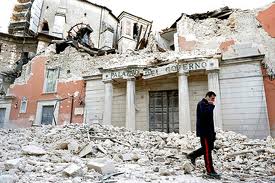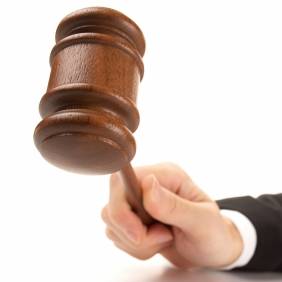 Today we heard that a group of seismologists have been jailed over the advice they gave prior to the 2009 quake in L’Aquila in Italy which killed over 300 people.
Today we heard that a group of seismologists have been jailed over the advice they gave prior to the 2009 quake in L’Aquila in Italy which killed over 300 people.
Is this good and right?
Well let’s start by imagining you lived in l’Aquila and a series of tremors had the town worried. A group of experts comes to town, and after a long meeting, come out and declare the risk is miminal. So rather than evacuating, you go home, rest assured, only to lose your family two days later.
I would want blood. I would want to lash out. My family could have been saved!
============
So at first glance this judgement may seem like a last sad ripple from a tragic event, however, it isn’t. Upon further reflection, this judgement has serious implications for the relationship between science and the law.
I have always been troubled by how a guilty verdict means ‘you did it’ even if you didn’t, turning ‘beyond a reasonable doubt’ into no doubt at all. I have previously blogged about pragmatism in law, and how you cannot be 80% guilty and thus serve 80% of a sentence.
With such pressures on the law to come to a clear conclusion, it was only a matter of time before a court was asked to decide on whether scientific advice was correct…
============
So today, when a court decided that scientists were ‘too reassuring’ to the public, my alarm bells were set ringing and still haven’t stopped.
Armed with the hindsight that an earthquake in fact did occur, it is natural that the families of the victims are appalled by the advice they got. However, in this case it is critical to also put yourself into the shoes of the scientist – in the days before the quake.
They must have honestly doubted a quake would happen. If you had expected a quake you would surely have said so!
In their statements they confirmed a quake was possible but unlikely. So what we have to ask is this: based on the data they had, was that conclusion faulty?
To answer that you only need to ask – do all tremors lead to quakes? Well no, most don’t. So the quake was by no means likely, let alone inevitable. They were not covering up. None in the group was suppressed or censored. I can only conclude that they, after years of chasing tremors, had come to discount the value of tremors as indicators.
=============
 And today, a judge decided that their advice was not only wrong, but criminally wrong.
And today, a judge decided that their advice was not only wrong, but criminally wrong.
The problem here is that science is not a PR exercise. If scientists put spin on data, they lose credibility. If they cry wolf, they lose credibility. The only safe way to do science is to stick to the facts. The facts did not indicate an imminent earthquake. The judge does not seem to realise: scientists cannot, and do not claim to be able to, predict earthquakes.
Perhaps the judge should read Taleb’s treatise on rare events, and he’d seen that just because something is unlikely (as the scientists said) does not protect us from the possibility it may still happen.
=============
So what we have seen today is this: scientists, giving their edified analysis, have been thrown in jail. The mob are satisfied, but you should be distinctly worried.
=============
See also: Letter from the AAAS to the Italian president

